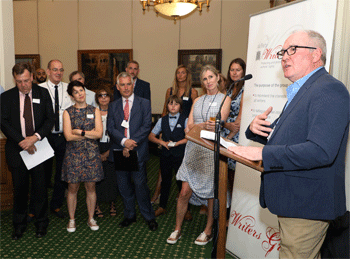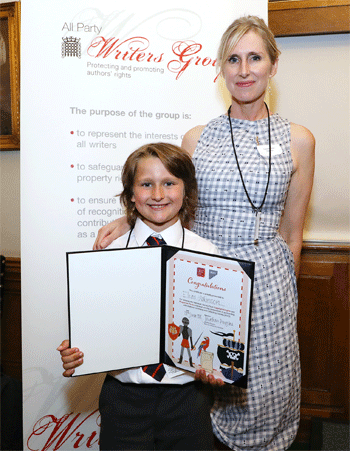From announcing the winner of the ALCS-sponsored Copyright Knights and Plagiarism Pirates National Literacy Trust competition, to hosting the festivities of National Writing Day, this summer’s APWG reception was bursting with activity. The official release of the ALCS Authors’ Earnings 2018 survey findings, which predictably shows the financial struggle writers are currently battling, also culminated in a call to action that MPs and writers alike were keen to respond to.
Rt Hon John Whittingdale OBE MP, Chair of the APWG, opened the event by discussing the importance of the APWG in an age when being an author is becoming increasingly difficult. He spoke about a recent meeting he’d attended – along with Barbara Hayes of ALCS and Nicola Solomon of the Society of Authors – with the new minister for Arts, Heritage and Tourism, Michael Ellis MP, in which the extension of PLR to elending had been discussed along with the findings of the ALCS Authors’ Earnings 2018 survey. In parallel to these findings, the APWG has launched a call for evidence; encouraging all types of writers to provide written evidence on the professional challenges specific to authors, as well as the position of writers in the creative industry.
Tony Bradman, children’s author and ALCS Chair, then officially announced the ALCS authors’ earnings 2018 findings in more detail, as well as discussing how these figures actually aff ect writers. He spoke frankly about his past experiences of going into schools and having children ask him about the earnings of writers. He said they were shocked to learn that “if [he had] a book sold at £3.99 as a trade price, [he’d] receive about 20p. And this amount has only decreased over the years”. When you take a look at the fact the median annual income of writers in 2017 was £10,500, compared to £12,330 in 2005, it makes sense that Bradman’s percentage cut of his work would be so low.
ect writers. He spoke frankly about his past experiences of going into schools and having children ask him about the earnings of writers. He said they were shocked to learn that “if [he had] a book sold at £3.99 as a trade price, [he’d] receive about 20p. And this amount has only decreased over the years”. When you take a look at the fact the median annual income of writers in 2017 was £10,500, compared to £12,330 in 2005, it makes sense that Bradman’s percentage cut of his work would be so low.
With the release of these figures, and the creation of movements like Content for Education, now more than ever writers need the support of legislators to help protect their creative futures. This is why groups like the APWG are vital to share knowledge about the environment in which writers strive to earn a living so that MPs and Lords can consider this when seeking any legislative changes. Bradman took a few moments to speak about the importance of fighting for writers rights:
“The thing we say to the APWG, and the thing we say to you, is we must protect the copyright legislation that makes it possible for us to get value for our work. At the same time, we must enhance people’s understanding of the value of our work. It’s economic, but it’s moral too. We are the unacknowledged legislators. We are the people who produce the books your kids read in school so they can study literacy, we are the people who produce the books you read on holiday or when you go to bed at night. We’re the people who produce the pharmaceutical texts, the legal texts, the stuff about politics, non-fiction. We have to be able to continue to do that; to generate those intellectual, cultural and economic returns to the country and get value for our work.”
Bradman also spoke about the importance of National Writing Day, suggesting that “kids are always interested in the writing process – but with restrictions on time and budgets in schools they don’t always get access to that kind of creativity”, and going on to say he was encouraged by the success of First Story, the founders of National Writing Day, connecting with so many schools around the country. While Monica Parle, Director of First Story, admitted “it’s getting harder to go into schools and inspire young children with writing”, they ran 85 residencies in secondary schools this year, up from 65 last year, which shows an encouraging interest in writing involvement.
 Celebrating National Writing Day was a key component of this summer’s APWG; not only was the room filled with writers, and MPs who support the creative process, but we were lucky enough to have Children’s Laureate, award-winning author and illustrator Lauren Child provide an insight into how she became an author. She spoke about her writing journey and how it not only become her career, but how it also helped her grow as a person: “the part of me that felt very diminished, grew a little, and that is one of the wonderful things that drawing, or music or writing can really do for you”.
Celebrating National Writing Day was a key component of this summer’s APWG; not only was the room filled with writers, and MPs who support the creative process, but we were lucky enough to have Children’s Laureate, award-winning author and illustrator Lauren Child provide an insight into how she became an author. She spoke about her writing journey and how it not only become her career, but how it also helped her grow as a person: “the part of me that felt very diminished, grew a little, and that is one of the wonderful things that drawing, or music or writing can really do for you”.
Among this celebration of writing Elias Atkinson, the winner of the ALCS-sponsored National Literacy Trust competition Copyright Knights and Plagiarism Pirates, was presented with his award. The competition was designed to explain the challenging concepts of copyright and plagiarism to children in Key Stages 1–3 in a vibrant and memorable way. Elias wrote his own copyright code of conduct and received his award from Lauren Child after Jonathan Douglas, CEO of the National Literacy Trust, had said a few words. Having recently conducted research into the importance of literacy for children’s development, he spoke about a significant finding: “Kids who write for enjoyment are seven times more likely to achieve above their age in writing tests – it’s so important that the enjoyment isn’t the icing on the cake, it is the cake!” When you look at findings like this and take note of Lauren Child’s personal journey with writing, it’s easy to see why writing, for pleasure as well as for work, is an activity that should be widely celebrated.
Douglas went on to discuss the significance of the National Literacy Trust’s relationship with ALCS: “when we work with ALCS, we celebrate the fact that in return for sharing and telling their stories, writers should expect recognition for their writing and expect respect for their creativity” which encapsulates the objective of the APWG and ALCS, and echoed the theme of the afternoon – that writers deserve to have the stability and protection to create content not just for others to enjoy, but for the cultivation of their own creative lives.
You can read the results of the authors’ earnings findings here and further information on the APWG inquiry into authors’ earnings can be found here.
Pictures © Richard Lewis
